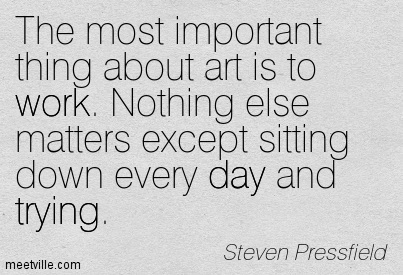THE WORK BOOK
International bestselling author, screenwriter and renowned military historian Steven Pressfield has a book called Do the Work. It’s about how to create and finish anything. A business. A book. A song. A philanthropic venture.
Whatever point you are at on your life’s journey – take the time to read Do the Work. It’s not work. It’s a joy. It’s not long. Takes about an hour to read – if you’re slow like me. It’s not dull, it’s brilliance, wrapped around hard-earned knowledge, deep inside timeless wisdom.
I met Steven Pressfield in 2007 when I interviewed him for an article called “How to Defeat Your Inner Deadbeat.” Since then I’ve had the pleasure of doing a couple other articles with him; “Non Vi Sed Arte – Not by Strength, by Guile,” and “The Power of Resistance.” The breadth, depth, and clarity of Steven’s ideas and writing are unparalleled in today’s world. They don’t teach this stuff in school. I don’t think they can. Some things are just ineffable.
BULL-SHIITAKE
To that, Steven would say, “Bull-Shiitake,” and laugh when he said it. Then he’d say, “You can do it too – just DO THE WORK.” He’s one of the true renaissance writing geniuses of our times. Why do I say that?
I don’t.
HIS WORK DOES
Steven Pressfield has written or co-written 34 screenplays, and is the author of international bestsellers “The Legend of Bagger Vance” (also a movie),; “Gates of Fire, An Epic Novel of the Battle of Thermopylae,”; “Tide of War,” ; “The Afghan Campaign,”;“Virtues of War,”; “The War of Art: Break Through the Blocks and Win Your Creative Battles,” “Killing Rommel,”; “THE PROFESSION,”; “Do the Work”; The Warrior Ethos,”; and his latest book, “The Lion’s Gate,” which film rights were recently aquired by Basil Iwanyk, who backed ‘The Expendables.’
THE SEARCH FOR MEANING, ART & WORK
I first became aware of Steven – not from any of his famous books or movies – but because a writer friend of mine gave me his book “War of Art.” Anyone that has ever met me knows, “art” is not the first word that comes to mind when describing my reading fare. Not the first word, but maybe right after the last word. However, my friend was dogging me out for always spouting off about what a great book should be – short, clear, emotionally powerful, life-changing – and he said “War of Art” was right up there with my all-time favorite, Viktor Frankl’s “Search for Meaning.”
I didn’t believe it. I only read the “War of Art” so I could refute, belittle, and humiliate my well-meaning, but almost-always-wrong, friend about the absurd deficiencies of the book in comparison to “The Search for Meaning.”
I read “The War of Art.“ I was wrong. Completely. Utterly. Embarrassingly. It was just as good in a different kind of way.
The Search for Meaning was about finding a way to survive in any environment – even a death camp – and how to find meaning in it.
The War of Art is about how to find a way to create in any environment – even a boring or bad one – and how to experience meaning while doing it.
Do the Work is a companion to The War of Art. A workbook. A shut up and do-it guide. It treads some of the same turf as the War of Art. It fights the intractable, implacable, insidious foe of mankind – Resistance. But it’s also an indispensable guide to winning at business or life.
NOT TAUGHT AT ANY SCHOOLS
The lessons in Do the Work are not taught at any business school. Couldn’t be. This is wisdom of the elders secret knowledge type of stuff passed on only by someone who has experienced it. Someone who has seen further, accomplished more, experienced more because they DID THE WORK.
THREE-CLASS ACTS
Do the Work is a 1-2-3 type process of getting a project accomplished, a book completed, a business started. Music, science, business and writing all seem to follow a similar three act structure.
Musicians (which I don’t claim to be but hack around at it) have the Sonata form which consists of a statement, development and recapitulation.
Scientists use the hypothesis, inference and verification method.
Philosophers use hypothesis, anti-thesis, synthesis (Hegel’s dialectic).
Writers focus on three acts; the beginning, middle, and end.
Do the Work shows you DaVinci, the Vietnam Memorial and Facebook – in three acts.
WHO TEACHES THESE GEMS?
What school or teacher would tell you …
- To start before you’re ready?
- To stay stupid?
- To be stubborn?
- To stay primitive?
- To go on a research diet?
- To swing for the seats?
- That the problem is not you … the problem is the problem?
These gems are like master ideas. Once you get them, you never forget. But these ideas and lessons are necessary to get your work done. Any work. They’re also necessary because the creation of any great thing is born in chaos. Not ease.
Babies are born in blood and chaos; stars and galaxies come into being amid the release of massive primordial cataclysms.
The most highly cultured mother gives birth sweating and dislocated and cursing like a sailor.
The hospital room may be spotless and sterile, but birth itself will always take place amid chaos, pain and blood. – Steven Pressfield
AND…
When I was writing “The Greatest Words You’ve Never Heard: True Stories of Triumph,” and mentioned it to Steven he had the perfect comment to me … and it led to me actually finishing the book (you’ll have to read the intro to see what it was.) I thanked him in the intro of the book for his inspiration and help through the years. But, there’s one thing that he said, and I heard but didn’t hear. Didn’t understand it until I finished.
We must do our work for its own sake, not for fortune or attention or applause.
That’s hard. Really hard. But when you do that you will become the consumate pro. You will concentrate on making meaning … you won’t have to search for it.
So … how do you create and finish anything?
Work the DO
Do the WORK.
###




Recent Comments
Lessons Learned from Hollywood STORY Guru Robert McKee